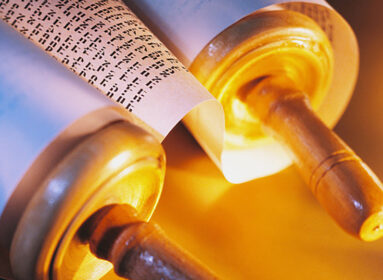
By Shlomo Riskin
“Gather together and I shall tell you what is to happen at the end of the days” (Gen. 49:1)
The portion of Vayehi, and the entire Book of Genesis, concludes with Jacob’s deathbed scene in which he “reveals to his sons what will befall them at the end of the days,” expressing the various strengths and weaknesses of each of his heirs and foretelling what each tribe will contribute to the future Jewish history. He is both Jacob the father of a family as well as Israel the father of a nation. He leaves the world in the fullness of his success as a parent who has finally united his family, and as a patriarch who has established the guidelines for an emerging nation with a mission to unite the world.
Jacob is indeed called by our Sages “the chosen one of the Patriarchs.” What made him deserve this very special accolade? What is the unique contribution which he made to the legacies of Abraham and Isaac? Our Sages compare Abraham to a mountain, Isaac to a field and Jacob to a house (or household) (Pesahim 88a).
The secret to a successful family – as well to a successful nation, which is after all, a family “writ large” – is to be found within the persona of Jacob, perhaps even within the very blessings he bequeaths to his sons. What is it? The major challenge to each of the Patriarchs was that of succession. Each needed to identify which of the children in the next generation would be the bearer of the Abrahamic legacy. The major struggle within Jacob’s life was the deception he perpetrated upon his father, albeit at the behest of his mother, to wrest away the blessings Isaac had meant to bestow upon his older brother, Esau.
This act of deception, no matter how justified it may have been in the light of the characteristics of each of the brothers, was to haunt Jacob for the rest of his life: He is deceived by Laban, who argues that in his place the younger sister does not receive a prize before the elder; he is deceived by his sons who tell him that a wild beast tore apart his beloved Joseph; and he is even deceived by Joseph who, while dressed up as the Grand Vizier, requests that Jacob send Rachel’s only remaining son, Benjamin, to Egypt.
His punishment goes even further: His beloved Rachel dies before her time because she deceives her father Laban by stealing his household gods (in the Mari and Nuzu documents from that time, the one who got the household gods also received the parental inheritance.)
And Jacob seems to be so resentful of his loving mother’s role in suggesting and facilitating his deception that the Bible mentions his weeping over and providing the burial for his nurse Deborah with ne’er a mention of Rebekah’s death and Jacob’s mourning over her.
Now, at the end of his life, the time has come for Jacob to bless his own sons. In previous commentaries, I have maintained that Isaac wanted to give the material blessings to Esau and the spiritual “messianic” blessings to Jacob, whereas Rebekah had insisted that both areas of leadership must to Jacob.
Indeed, Joseph’s dreams expressed his mastery in both the realm of the material (the 11 sheaves of grain bowing down to his sheaf) as well as of the spiritual (the 11 stars bowing down to him). Logic would indicate that Joseph would receive both of these blessings from Jacob.
But this is not to be the case. In the past, the rejected son was ousted from the family: Ishmael was actually banished from Abraham’s household and Esau left the ancestral homeland for Seir-Edom. Jacob has learned that different strengths may warrant different blessings, that in a true family one victor need not be the recipient of all with the loser going into exile. A family – much like an orchestra – provides the possibility for different individuals (or tribes) each playing the instrument they can play best for the ultimate achievement of a harmonious symphony.
Hence Judah receives the spiritual blessing of the scepter of messianic leadership, the ingathering of all of the nations to Jerusalem when the world will be at peace (Gen. 49:10). And Joseph receives the blessing of material fruitfulness (the ten tribes, especially Ephraim and Manasseh) and the physical ability to overcome the arrows of our enemies (ibid. 22-26). Jacob succeeded in uniting his family and in giving a charge to the tribes for a united nation. The latter has yet to be achieved – and therein lies the prescription for the true coming of our redemption.
Rabbi Shlomo Riskin is chancellor emeritus of Ohr Torah Stone and chief Rabbi of Efrat, Israel.







 Southern New England Jewish Ledger
Southern New England Jewish Ledger














